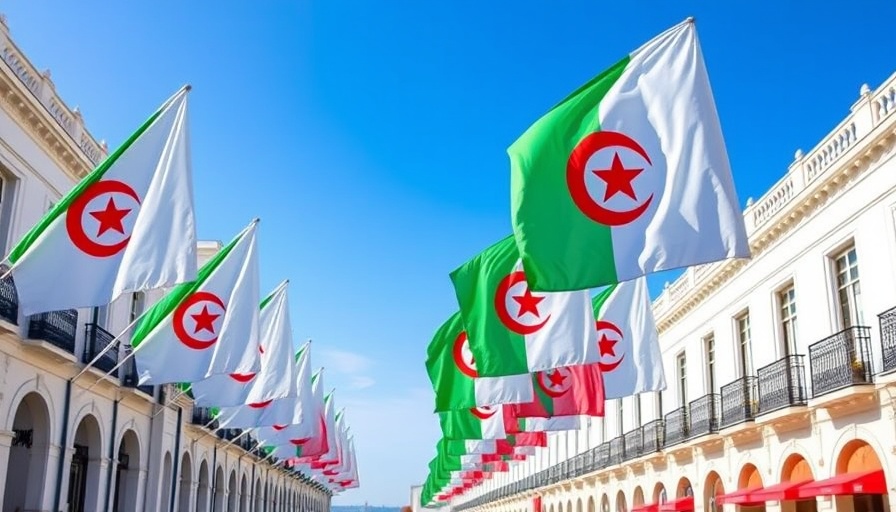
A Growing Diplomatic Rift: The Crisis Between France and Algeria
The diplomatic relations between France and Algeria are experiencing unprecedented strain following Algeria's decision to expel 15 French diplomatic agents on May 12th. This expulsion further underscores the deep-seated mistrust and escalating tit-for-tat measures that have characterized the relationship between these two countries in recent months.
In France and Algeria in deepening diplomatic crisis amid Tit-for-Tat expulsions, the video discusses the escalating tensions, prompting a deeper analysis of their historical relations and current implications.
Backdrop of Tension: Understanding the Historical Context
To understand the current diplomatic rift, one must consider the historical context of Franco-Algerian relations, which have long been marked by post-colonial legacies. Algeria's independence from France in 1962 ended 132 years of colonial rule, and the scars of this tumultuous history continue to shape diplomatic interactions. This recent move by Algeria can be seen as a response to perceived injustices and ongoing political grievances stemming from France's handling of North African affairs, particularly in the context of regional alliances and support.
The Trigger: Recent Diplomatic Expulsions
The expulsion of French diplomats by Algeria highlights the fraught atmosphere between the two nations. Algeria's Ministry of Foreign Affairs characterized the expelled diplomats' actions as engaging in "ordinary irregular positions," suggesting a major breach of diplomatic protocol. French officials, including Foreign Minister Jean-Noël Barrot, have condemned this action as unjustified, promising a nuanced and immediate response. This cycle of retaliatory measures is not a new phenomenon, as both countries have expelled diplomats from each other’s embassies in the past, indicating a pattern of hostility rather than cooperation.
Complicated Alliances: France and Morocco
The situation has been further exacerbated by France's overt support for Morocco regarding its autonomy plan over the disputed Western Sahara region. This stance is viewed by Algeria as a betrayal, given its longstanding position advocating for the Sahrawi people's right to self-determination. Such geopolitical dynamics add layers to the diplomatic crisis, invoking national sentiments and presenting complex challenges for both countries as they navigate international expectations.
Alternative Perspectives: Diverse Opinions on the Crisis
While there is widespread condemnation for the recent expulsion from the French perspective, responses from within Algeria and among its allies reveal a more nuanced view. Some political commentators argue that Algeria's actions are justified in light of ongoing international pressures and the need to assert national sovereignty. Understanding this multifaceted crisis requires balancing historical grievances with contemporary political realities, accentuating the complexities at play in international diplomacy.
The Future of Franco-Algerian Relations: Predictions and Insights
Looking ahead, the trajectory of Franco-Algerian relations remains uncertain. The growing animosity could lead to further isolation or graver tensions between the countries, which may disrupt economic and cultural exchanges critical to both nations. Acknowledging and addressing the underlying issues—imperatively through dialogue—might open avenues for re-establishing trust and cooperation.
Understanding Implications: What This Means for African Diplomacy
This ongoing crisis illustrates how African nations must navigate their diplomatic relationships against the backdrop of historical legacies and emergent geopolitical interests. The efficacy of these relationships can significantly impact regional security dynamics and economic collaboration in Africa. As events unfold, the call for pragmatic solutions accentuates the critical role that African diplomats play in steering the future of the continent's political landscape.
France and Algeria's diplomatic crisis demonstrates that historical contexts continue to influence international relations today. As we analyze this complex situation, stakeholders must recall that fostering communication is essential for any forward momentum. The challenges presented by Algeria's expulsion of French diplomats and France's defensive reactions underline the urgent need for renewed efforts aimed at re-establishing a constructive dialogue that respects the sovereignty and perspectives of both nations.
Amid the chaos of shifting alliances and geopolitical contests, the insights drawn from this crisis offer valuable lessons for policymakers and diplomats working to maintain stability in Africa.
 Add Row
Add Row  Add
Add 




Write A Comment